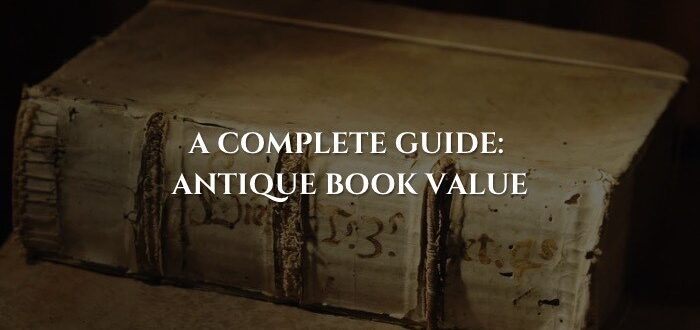Antique Book Value Guide: 10 Factors That Influence Worth
Imagine that you have just discovered a chest full of rare and old books in your attic! Some of them seem to be first editions, rare antique books. You might be wondering what you can do with these rare books. Do you sell them? If so, how do you find the value of old books? This guide is your answer to selling rare books. Books are more than mere keepers of stories; they are windows into bygone eras, carrying within them centuries’ worth of knowledge and stories. Rare books have a unique appeal. They can hold historical significance, aesthetic beauty, or sentimental value—but if you’re thinking about selling them, you need to know exactly what you have and what it’s worth. Finding the value of old books is very important to sellers and collectors alike. Rare and antique books can be collectible items if they are in good condition and in demand, but it can be hard to determine whether your books are valuable and, if they are, where to sell them to get the best price for your items. This guide will walk you through how to evaluate and find the value of antique books, and how you can sell your antique books and make a profit as a bookseller.

Determining Antique Book Value
To help determine the value of an old book, consider taking it to an antique book appraisal, where an expert will give you an estimated value. You can also conduct your own preliminary research with our old books value guide, to give you a baseline about your rare books’ worth before taking it for an appraisal.
10 Factors That Determine The Value Of Rare Books

Knowing whether your old or antique book is truly valuable comes down to more than age alone. Here are 10 key factors collectors and appraisers look at when assessing rare books.
- Is Your Book Really Rare?

The word “rare” gets used loosely, but a book must truly be scarce and in demand to hold significant value.
- Edition: First editions often carry the highest value, but not all first editions are equal. A culturally significant or historically important first edition—such as Moby-Dick, Jane Eyre, or a first printing of Harry Potter and the Philosopher’s Stone—can be worth thousands.
- Scarcity: Fewer surviving copies mean higher potential value.
- Special Features: Features like fore-edge paintings, fine leather bindings, or hand-colored plates can make a book far more desirable.
- Condition of the Book
Condition can make or break a rare book’s value.
- Check that all pages are intact and that the binding is secure.
- Heavy wear can significantly lower value—unless the book is truly one of a kind.
- An original dust jacket can multiply a book’s worth many times over.
Check the condition of your rare books condition before selling.
- Author’s Signature
A signed first edition can be especially valuable.
Authentication is essential: Forged signatures are common, so a certificate or expert verification is key.
- Publication Date
- The date of publication can reveal whether your book is a valuable first edition or a later reprint.
- Check the copyright page for more than one date.
- Look for terms like “first edition,” “first printing,” or “limited edition.”
Be aware that “copyright” or “reprint” dates may indicate a later, less valuable printing.
- Binding
- Unique or decorative bindings—especially fine leather or gilt designs—can enhance value.
- Hand-sewn bindings, marbled endpapers, or custom slipcases often signal quality and rarity.
Bindings tell you a lot about a book’s craftsmanship and prestige.
- Illustrations and Plates

- High-quality illustrations or hand-coloured plates can significantly increase a book’s desirability.
- Missing plates can drastically reduce a book’s value.
Note: A “plate” is an image printed separately from the text, often using techniques like engraving, etching, or lithography.
Also Read: Illustrated Wonders: Rare Books With Illustrations
- Is the Book Famous?
Not all old books hold cultural weight, but certain titles have timeless appeal.
Enduring classics: Works like Shakespeare’s plays, Dickens’ A Christmas Carol, and Austen’s Pride and Prejudice.
Literary adaptations: If a book has been turned into a major film, TV series, or stage play, demand often rises.
- Historical or Cultural Significance
Books tied to important events, movements, or figures often attract serious collectors.
- Diaries, letters, and firsthand accounts from pivotal historical moments.
- Works connected to revolutions, scientific breakthroughs, or influential cultural shifts.
- Provenance
Provenance is the documented history of a book’s ownership.
- Ownership by a notable person, or inclusion in a famous collection, can add prestige and value.
- Original receipts, bookplates, or signed gift inscriptions are all clues to provenance.
- Age of the Book
While age alone doesn’t guarantee value, it can play a major role when combined with other factors.
Craftsmanship: Older books may have hand-sewn bindings, handmade paper, and printing techniques that are no longer used.
Survivorship: The further back in time, the fewer copies survive in collectible condition, the more value it fetches.
Also Read: Bidding For Rare Books
Credit Source:
Tom Ayling @tomwayling
Common Myths About Rare Book Values
- Myth: All old books are valuable.
Reality: Age alone doesn’t equal value. A 200-year-old book in poor condition might be worth less than a pristine 50-year-old first edition.
- 2. Myth: You can get retail price selling to a dealer.
Reality: Dealers buy at wholesale so they can make a profit.
- Myth: Restoration always increases value.
Reality: Poor or unnecessary restoration can ruin a book’s market appeal.
The Art of Selling Rare Books
Determining the value of an old or rare book can be complex, which is why the expertise of a professional rare book dealer can make a huge difference. With the factors above in mind, the next step is deciding where—and how—to sell.
If you’re wondering where to sell your antique books, online rare book auctions are one of the best options. These platforms open your collection to a global audience of serious buyers, increasing your chances of securing the best possible price.
Why Online Rare Book Auctions Work So Well
- Global Reach – Your book is visible to collectors, dealers, and enthusiasts worldwide.
- Competitive Bidding – Multiple interested buyers can drive the final sale price higher.
- Specialized Audience – Auction platforms attract people specifically looking for rare and collectible books.
- Time-Bound Sales – Auctions create urgency, encouraging buyers to make strong offers before the deadline.
- Marketing Support – Professional listings, high-quality photos, and detailed descriptions increase buyer confidence and interest.
Looking to Sell Rare Books?
Giftex Online Auction can help you turn your collection into profit while keeping the process simple and transparent.
Transparent Fees – No hidden charges, so you know exactly what you’ll receive after the sale.
Skilled Experts to Analyse Your Books – In-depth evaluation ensures your books are priced to attract buyers and deliver value.
Direct Connection to Buyers – Our online auction platform puts your books in front of collectors actively searching for rare finds.
Making the Most of Your Rare Book Sale
Selling rare books is both an art and a business decision. If your book checks some of these boxes—rarity, condition, craftsmanship, provenance—now might be the perfect time to sell. But success isn’t just about finding a buyer; it’s about understanding what you have, presenting it well, and choosing the right sales channel. With expert evaluation and the reach of online rare book auctions, you can connect with the right collector and achieve the price your book truly deserves.






